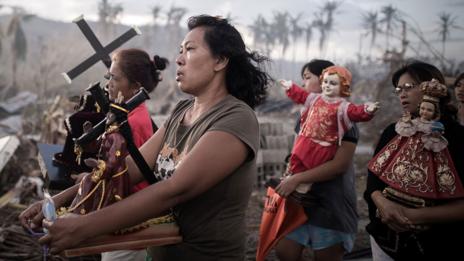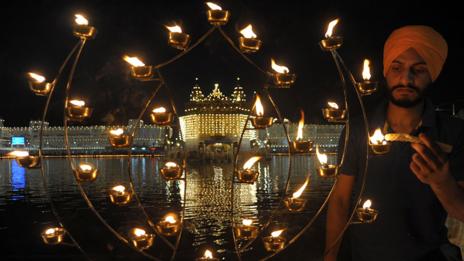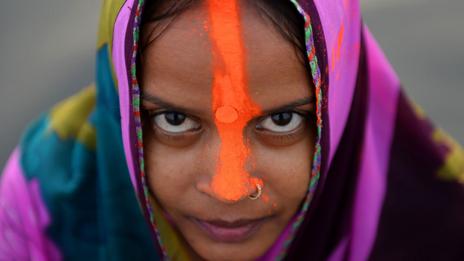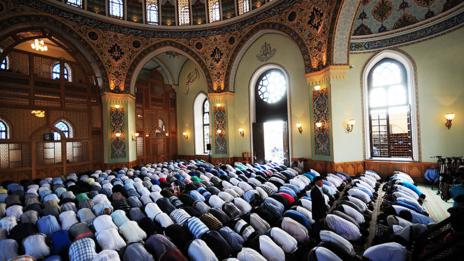Rachel Nuwer (BBC)
Atheism is on the rise around the world, so does that mean spirituality
will soon be a thing of the past? Rachel Nuwer discovers that the
answer is far from simple.
A growing number of people, millions worldwide, say they believe that life definitively ends at death – that there is no God, no afterlife and no divine plan. And it’s an outlook that could be gaining momentum – despite its lack of cheer. In some countries, openly acknowledged atheism has never been more popular.
“There’s absolutely more atheists around today than ever before, both in sheer numbers and as a percentage of humanity,” says Phil Zuckerman, a professor of sociology and secular studies at Pitzer College in Claremont, California, and author of Living the Secular Life. According to a Gallup International survey of more than 50,000 people in 57 countries, the number of individuals claiming to be religious fell from 77% to 68% between 2005 and 2011, while those who self-identified as atheist rose by 3% – bringing the world’s estimated proportion of adamant non-believers to 13%.
While atheists certainly are not the majority, could it be that these figures are a harbinger of things to come? Assuming global trends continue might religion someday disappear entirely?
It’s impossible to predict the future, but examining what we know about religion – including why it evolved in the first place, and why some people chose to believe in it and others abandon it – can hint at how our relationship with the divine might play out in decades or centuries to come.

A priest in Ukraine holds a cross in the ruins of Kiev's Trade Union building earlier this year (Getty Images)
Crisis of faith
Japan, the UK, Canada, South Korea, the Netherlands, the Czech Republic, Estonia, Germany, France and Uruguay (where the majority of citizens have European roots) are all places where religion was important just a century or so ago, but that now report some of the lowest belief rates in the world. These countries feature strong educational and social security systems, low inequality and are all relatively wealthy. “Basically, people are less scared about what might befall them,” says Quentin Atkinson, a psychologist at the University of Auckland, New Zealand.

Yemeni girls show their hands decorated with traditional henna designs as they celebrate the end of Ramadan (Getty Images)
The US, too, is an outlier in that it is one of the wealthiest countries in the world, but also has high rates of religiosity. (Still, a recent Pew survey revealed that, between 2007 and 2012, the proportion of Americans who said they are atheist rose from 1.6% to 2.4%.)
Decline, however, does not mean disappearance, says Ara Norenzayan, a social psychologist at the University of British Columbia in Vancouver, Canada, and author of Big Gods. Existential security is more fallible than it seems. In a moment, everything can change: a drunk driver can kill a loved one; a tornado can destroy a town; a doctor can issue a terminal diagnosis. As climate change wreaks havoc on the world in coming years and natural resources potentially grow scarce, then suffering and hardship could fuel religiosity. “People want to escape suffering, but if they can’t get out of it, they want to find meaning,” Norenzayan says. “For some reason, religion seems to give meaning to suffering – much more so than any secular ideal or belief that we know of.”

In the Philippines, survivors of Super Typhoon Haiyan march during a religious procession (Getty Images)
The mind of god
But even if the world’s troubles were miraculously solved and we all led peaceful lives in equity, religion would probably still be around. This is because a god-shaped hole seems to exist in our species’ neuropsychology, thanks to a quirk of our evolution.

A rabbi reads during Purim festivities (Getty Images)
System 1, on the other hand, is intuitive, instinctual and automatic. These capabilities regularly develop in humans, regardless of where they are born. They are survival mechanisms. System 1 bestows us with an innate revulsion of rotting meat, allows us to speak our native language without thinking about it and gives babies the ability to recognise parents and distinguish between living and nonliving objects. It makes us prone to looking for patterns to better understand our world, and to seek meaning for seemingly random events like natural disasters or the death of loved ones.

An Indian Sikh lights candles during Bandi Chhor Divas, or Diwali (Getty Images)
Similarly, System 1 encourages us to see things dualistically, meaning we have trouble thinking of the mind and body as a single unit. This tendency emerges quite early: young children, regardless of their cultural background, are inclined to believe that they have an immortal soul – that their essence or personhood existed somewhere prior to their birth, and will always continue to exist. This disposition easily assimilates into many existing religions, or – with a bit of creativity – lends itself to devising original constructs.

An Indian Hindu devotee a day ahead of the Chhat festival (Getty Images)
For all of these reasons, many scholars believe that religion arose as “a byproduct of our cognitive disposition”, says Robert McCauley, director of the Center for Mind, Brain and Culture at Emory University in Atlanta, Georgia, and author of Why Religion Is Natural and Science Is Not. “Religions are cultural arrangements that evolved to engage and exploit these natural capacities in humans.”
Hard habits to break
Atheists must fight against all of that cultural and evolutionary baggage. Human beings naturally want to believe that they are a part of something bigger, that life isn’t completely futile. Our minds crave purpose and explanation. “With education, exposure to science and critical thinking, people might stop trusting their intuitions,” Norenzayan says. “But the intuitions are there.”

Azerbaijani Muslims pray at the end of Ramadan (Getty Images)
“There’s evidence that religious thought is the path of least resistance,” Barrett adds. “You’d have to fundamentally change something about our humanity to get rid of religion.” This biological sticking point probably explains the fact that, although 20% of Americans are not affiliated with a church, 68% of them say that they still believe in God and 37% describe themselves as spiritual. Even without organised religion, they believe that some greater being or life force guides the world.

Buddhist monks file towards a ceremony at Sampov Treileak pagoda in Cambodia (Getty Images)
Religious experiences for non-believers can also manifest in other, more bizarre ways. Anthropologist Ryan Hornbeck, also at the Thrive Center for Human Development, found evidence that the World of Warcraft is assuming spiritual importance for some players in China, for example. “WoW seems to be offering opportunities to develop certain moral traits that regular life in contemporary society doesn’t afford,” Barrett says. “People seem to have this conceptual space for religious thought, which – if it’s not filled by religion – bubbles up in surprising ways.”
The in-group
What’s more, religion promotes group cohesion and cooperation. The threat of an all-powerful God (or gods) watching for anyone who steps out of line likely helped to keep order in ancient societies. “This is the supernatural punishment hypothesis,” Atkinson says. “If everyone believes that the punishment is real, then that can be functional to groups.”

A devotee at Thailand's Vegetarian Festival (Getty Images)
“When we see something so pervasive, something that emerges so quickly developmentally and remains persistent across cultures, then it makes sense that the leading explanation is that it served a cooperative function,” says Bulbulia.
Finally, there’s also some simple mathematics behind religion’s knack for prevailing. Across cultures, people who are more religious also tend to have more children than people who are not. “There’s very strong evidence for this,” Norenzayan says. “Even among religious people, the more fundamentalist ones usually have higher fertility rates than the more liberal ones.” Add to that the fact that children typically follow their parents’ lead when it comes to whether or not they become religious adults themselves, and a completely secularised world seems ever more unlikely.
Enduring belief
For all of these reasons – psychological, neurological, historical, cultural and logistical – experts guess that religion will probably never go away. Religion, whether it’s maintained through fear or love, is highly successful at perpetuating itself. If not, it would no longer be with us.
And even if we lose sight of the Christian, Muslim and Hindu gods and all the rest, superstitions and spiritualism will almost certainly still prevail. More formal religious systems, meanwhile, would likely only be a natural disaster or two away. “Even the best secular government can’t protect you from everything,” says McCauley. As soon as we found ourselves facing an ecological crisis, a global nuclear war or an impending comet collision, the gods would emerge.
“Humans need comfort in the face of pain and suffering, and many need to think that there’s something more after this life, that they’re loved by an invisible being,” Zuckerman says. “There will always be people who believe, and I wouldn’t be surprised if they remain the majority.”
Nessun commento:
Posta un commento